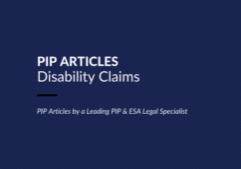Do I have to tell PIP if I start work?
The ability to work has in itself no direct relevance to entitlement to disability benefits such as personal independence payment and disability living allowance. However, we would talk to you about the nature of your work and test what you were telling us about the activities that make up the PIP test by looking at how you manage tasks at work that, on the face of it, require similar physical or mental/cognitive abilities.
Two situations
There are two situations, the client who works and who approaches us for help with a claim, a mandatory reconsideration or an appeal; and the client who has an award and who is considering taking up work. Let us consider the first of these. We need to know what would be the right award, given all your circumstances. Working adds another layer of complexity to that assessment, in the same way that someone having multiple medical conditions and/or very variable symptoms does. The DWP can be expected to take a negative view of the work that you do, making assumptions about what the work involves and any apparent contradictions between the description of limitations set out in the claim form/reconsideration request/appeal and what they think your ability to work tells them.
It is rarely a case of looking at the hours worked, so the question of how many hours can be worked on PIP or disability living allowance is unlikely to arise. You can see though that a client whose claim is largely based on fatigue and who works full-time will have more explaining to do if a negative conclusion is to be avoided. The four clients who worked full-time and whose successful appeals spring to mind were a security guard, a civil servant, an office worker and a solicitor. Perhaps the point here is that they all had to appeal to get what they were entitled to, so the assessor, the first and second decision makers all got it wrong.
Permitted work
You might have come across the permitted work schemes for employment and support allowance (ESA), in which payment of the benefit is unaffected by working as long as the criteria for the different permitted work schemes are met. There is no similar provision with personal independence payment, so that the money you earn and the number of hours you work do not directly affect the PIP payable. We could not recommend that you simply leave out any mention of the work you do when completing the form. We have seen the distress caused by a later decision that the client was never entitled to the award they had, perhaps alleging that they had exaggerated how they were affected at the time. Such a client is immediately on the back foot if they say that they were not asked whether they worked on the form, and so had seen no need to mention it. Better we say to deal with any apparent contradictions when completing the claim form or putting in a reconsideration request/writing an appeal. Those four clients who worked full-time came to us for help with their appeals, having been turned down at the claim and reconsideration stages.
Put yourself in the place of the assessor or decision maker; if you have explained about the problems you have with walking, it makes sense to explain how you get to work, how you get from the train, bus or car to the building and how you get around the building, so to the canteen and toilets for example. We appreciate that the activity Moving around is looking at walking outdoors but the assessor, decision maker and tribunal will look at how you managed indoors at the assessment, so this is no different. Think about special parking arrangements put in place for you, any risk assessment carried out, any ‘buddy’ arrangements for getting you out of the building in an emergency, any assessment of your need for special equipment, such as a variable height desk, specialist computer mouse or keyboard. Does your sick record tell a story? Written statements from a manager or colleagues could carry more weight for this purpose than those provided by family and friends.
You might have explained in the claim about a limitation with preparing and cooking a main meal because of problems with your hands. Think about whether your job title and duties could make the DWP think, well if you can type, hold a telephone handset, etc, then can your hands really be as bad as you are claiming? You know the answers to these questions, so tell them. Get the information in as early in the process as possible, to try and avoid having to challenge a wrong decision, and so that you are being consistent in your evidence before you get to the reconsideration and appeal stages.
What about taking up work or returning to work when you already have an award in place, whether this is part-time or full-time work?
Starting work need not be a relevant change of circumstances. Has anything changed? Have symptoms eased or has some medication been found that has made a difference? Examples might include medication that has finally eliminated seizures or reduced the pain that you have been experiencing. That first person still has epilepsy but entitlement to disability living allowance or personal independence has never been about having a diagnosis; it has always been about how that medical condition affects them. So, the person who no longer has seizures has had a ‘material’ change of circumstances, a change capable of affecting the points that should be scored, and therefore their award. They could have scored for needing supervision to cook a meal, supervision to shower or bathe, or supervision to follow the route of a journey without another person. Does that need for supervision still exist? Why?
Has a knee or hip replacement had an impact on Preparing food, Washing and bathing, Managing toilet needs, Dressing or Moving around? You might have moved from being unable to do it without physical help from another person, to being able to do the activity but with the help of aids or appliances. Looking at the PIP test, the need for assistance from a person scores more points than the need for a thing (an aid). An example would be that you needed to be helped up from the toilet before but you now manage the task alone, relying instead on a rail or the nearby sink. That change would reduce entitlement by 2 points, which might take you below the 12 points needed for the enhanced rate.


